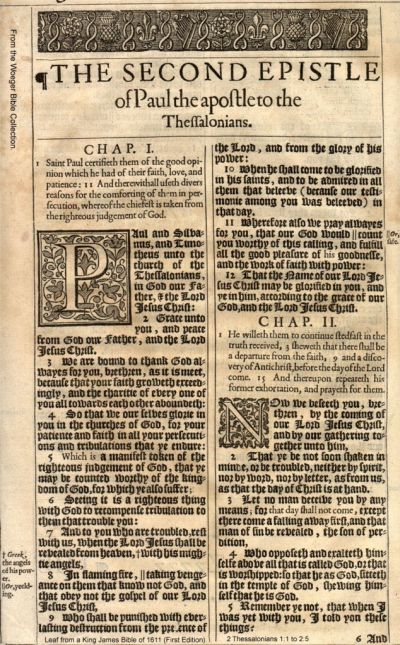Session 18 - 2 Thessalonians
Author
Paul, with Silas (Silvanus) and Timothy.
Date of Composition
Most likely written in AD 51-52, not long after 1 Thessalonians. The church fathers Polycarp, Ignatius and Justin all refer to the letter. Irenaeus (130-202) quotes it by name.
Purpose and Audience
This is the shortest letter from Paul to any church and is characterized by its central idea of patient waiting for the "Day of the Lord" (the return of Christ). The occasion of its writing seems to be to correct their wrong views of the Second Coming of Christ and errors of life growing out of it. It may be that they had misunderstood Paul's teaching to be that the day of the Lord was already at hand (2:2; the Greek says "just at hand", which sounds very close). Some thought it had come already so they stopped working. Also, the church was still being persecuted, so they would have been keen to see the return of Christ. Paul wrote to clear up misconceptions and to encourage them.
Context ... Paul probably had received a second report from the church, detailing questions about the end times. Several of his references indicate that some people in (or visiting) Thessalonica were deliberately misleading the new believers, even to the point of claiming special visions and revelations; there were false teachers forging letters to make them look as if they had come from Paul (2:2). This reverse plagiarism was upsetting some in the church. Paul therefore took extra care to make sure the Thessalonians understood not only his views about the end times but also what his handwriting looked like, so they would be able to identify letters as authentically his (3:17).
Paul explained to them that the time of "tribulation" had not yet come because a certain "man of lawlessness" had not yet been revealed (2:3). Comparisons with other passages in Daniel, Matthew, and Revelation reveal this entity to the Antichrist. But Paul encouraged the Thessalonians not to worry, because the Antichrist would not come until an unnamed restrainer was removed from earth (2:6-7). The identity of this restrainer continues to be debated. The reference is possibly to the Holy Spirit; others believe it refers to the church, working redemptively in the world. When the believers leave the earth, all who remain will experience the tribulation.
Paul reminds the Thessalonian Christians that their hope in Christ's future return should serve as an encouragement to them in their suffering, motivating them to live for Christ. Paul always connected his teaching on Jesus with the practical growth he expected to see as a result of a deeply held faith.

2 Thessalonians is filled with information that explains the end times. It also exhorts us not to be idle, but to work for what we have. There are also some great passages that can be an example for us on how to pray for other believers today.
Structure
| Introduction | - | 1:1-2. |
| Thanksgiving and prayer for in view of the second coming of Christ | - | 1:2 end. |
| Warnings about Christ's second coming | - | 2:1-12. |
| Their escape at His coming | - | 2:13 end. |
| Practical matters | - | 3:1-15. |
| Their prayers for each other | - | 1-5. |
| Discipline for the disorderly | - | 6-15. |
| Conclusion | - | 3:16 end. |
Key Issues
Christian Community
"Dear brothers and sisters, we can't help but thank God for you, because your faith is flourishing and your love for one another is growing." (1:3)
This sounds like an exemplary church. Church growth is too often measured in terms of "bums on seats", boards, budgets, buildings, business connections and best people being attracted, but this church is different: souls saved, lives redeemed, divided families restored, a community known for its growing love. Christians need to be at the forefront of loving one another. In the early Church, Tertullian tells us that pagans were struck by the witness of Christian love. "See how they love one another!" they would remark.
I wonder how many people look at us and say the same. "By this shall all men know that you are my disciples," Jesus tells the Apostles, "if you have love one for another." (John 13:35). This intense love doesn't just cover over a multitude of sins, it's a litmus test of faith. In this broken world, let us be love.

Standing Firm in Suffering
"We proudly tell God's other churches about your endurance and faithfulness in all the persecutions and hardships you are suffering. And God will use this persecution to show his justice and to make you worthy of his Kingdom, for which you are suffering. In his justice, he will pay back those who persecute you. And God will provide rest for you who are being persecuted and also for us when the Lord Jesus appears from heaven." (1:4-7)
This letter has strong medicine for today's church. Never before have Christians been as widely persecuted for faith in Christ. When Paul speaks to the Thessalonians of "the persecutions and hardships you are suffering" (1:4), he is describing an experience familiar to many believers around our world. Jesus said, "you will be hated by all for my name's sake" (Mt 10:22). Let's not be deceived by populist Western Christian teaching that airbrushes suffering out of its comfortable but limited theological narrative.
Yet whatever kind of hostility Christians are enduring, the great promises of the Gospel of God's grace hold true and provide solid footing. God has chosen us (2:13). He has summoned us to himself through the Gospel, leading us ultimately into the very glory of Jesus himself (2:14). God "loved us and gave us eternal comfort and good hope through grace" (2:16). We are not to be disheartened. Nor are we to sit back and do nothing - some of the Thessalonians appear to have been doing (cf 3:6-12).
As believers around the world find themselves embroiled in conflict due to their faith, whether locally or all the way up to nationally, we can take heart at the great promises of the Gospel. In the midst of battles for human rights, the sanctity of life, human dignity, social values, marriage and family, we press on with hope. For although "the mystery of lawlessness is already at work" and "the activity of Satan" seems overwhelming, "Jesus will kill with the breath of his mouth and bring to nothing" the hostile forces of hell that spur on the earthly evils we see all around us (2:7-9). Strong language. Urgent message.
The Return of Christ
The return of Jesus is mentioned 318 times in the New Testament. It was uppermost in people's expectations.
"when the Lord Jesus appears from heaven ... He will come with his mighty angels, in flaming fire, bringing judgment on those who don't know God and on those who refuse to obey the Good News of our Lord Jesus. They will be punished with eternal destruction, forever separated from the Lord and from his glorious power. When he comes on that day, he will receive glory from his holy people - praise from all who believe. And this includes you, for you believed what we told you about him." (1:7-10)
Paul assures the Thessalonian Christians that the day of the Lord that he taught them about (and reinforced in his first letter to the church) has not yet come (2:2); they should not be swayed by people claiming otherwise (2:3).
Church history is filled with speculation about the timing and nature of the return of Christ. Entire denominations and cults have used their interpretations of prophecies contained in the Bible, and their own additions, to pin point signs, circumstances, dates and people connected with the return of Jesus. The emphasis in the Bible is not on sitting back and waiting, but working at what God has called us to do and be.
"With all these things in mind, dear brothers and sisters, stand firm and keep a strong grip on the teaching we passed on to you both in person and by letter." (2:15)
Sidebar: if Jewish leaders of the inter-Testamental period and the first century misunderstood the nature of the coming of the Messiah, and early Christians misunderstood the timing of His return, what are we missing? Just a thought…
Who is the Antichrist?
"For that day will not come until there is a great rebellion against God and the man of lawlessness is revealed—the one who brings destruction. He will exalt himself and defy everything that people call god and every object of worship. He will even sit in the temple of God, claiming that he himself is God. Don't you remember that I told you about all this when I was with you?" (2:3-5).
Check out his naked ambition. He opposes God; he exalts himself above God; he wants to be worshipped (this sounds like Satan's demand in Jesus temptation, cf Luke 4:7); he craves worship). The term "antichrist" is not used in this letter, which talks instead about a "man of lawlessness". Polycarp (69 - 155) warned the Philippians that everyone who preached false doctrine was an antichrist.
The identity of the antichrist has been debated over the centuries and has included: Emperors Nero, Caligula, and Domitian, various popes, Napoleon, the Russian Tsar, Hitler, Henry Kissinger (the "man of sin", for "sin" is in his surname, Jewish background, peacemaker, leader), Ronald Wilson Reagan (note six letters in each name, 666), Mikhail Gorbachev (he even had the mark on his forehead) and Barak Obama. Singer Johnny Rotten proclaimed that he was an "antichrist". Obviously, guesswork (some serious, some silly) has missed the mark. Time will tell. The lesson is that we should not get caught up in games, but focus on Christ; He is the one we are waiting for.
The Antichrist is a counterfeit Christ. Paul is clear that there will be a man of sin, who come with great power, signs, miracles and authority.
"This man will come to do the work of Satan with counterfeit power and signs and miracles. He will use every kind of evil deception to fool those on their way to destruction, because they refuse to love and accept the truth that would save them. So, God will cause them to be greatly deceived, and they will believe these lies. Then they will be condemned for enjoying evil rather than believing the truth." (2:9-12)
Contrary to scary images that often go with words like "antichrist", he will deceive and be accepted by many and exercise control, until taken out of the way by Christ. 1 and 2 Thessalonians (see 2:7-10) provide stark contrast between the end state of those who trust in Christ, in spite of persecution, and judgement that will come on unbelievers, as a result of their choice.


Reassurance of our Salvation
"God chose you to be among the first to experience salvation—a salvation that came through the Spirit who makes you holy and through your belief in the truth. He called you to salvation when we told you the Good News; now you can share in the glory of our Lord Jesus Christ." (2:13, 14)
There is a very clear assurance here. We are saved solely through the work of the Holy Spirit because we believe the truth of the Bible's message about Christ. This gives us hope that is not found anywhere else.
Consider the following letter written in the 3rd Century by one Cyprian to his friend Donatus:
"It is a bad world, Donatus, an incredibly bad world. But I have discovered in the midst of it a quiet and good people who have learned the great secret of life. They have found a joy and wisdom which is a thousand times better than any of the pleasures of our sinful life. They are despised and persecuted, but they care not. They are masters of their souls. They have overcome the world. These people, Donatus, are Christians. . . and I am one of them."
For Reflection:
- Christians in Thessalonica (new believers) were being persecuted for leaving their old gods and way of life; some may have been expelled by families and friends and dislocated from their old culture and way of life. Following Christ cost them a lot.
- Pray for those who likewise experience persecution and violence in our day because of their Christian faith.
- Pray that extremists considering future terror attacks will discover Jesus and have a change in heart.
- We ought to encourage those who experiencing problems in their personal lives (3:3); who do we know who stands in of such encouragement? They are not far away. If we feel discouraged, we can also take heart in God's faithfulness (3:3).
- Consider the following personal goal:
"So, we keep on praying for you, asking our God to enable you to live a life worthy of his call. May he give you the power to accomplish all the good things your faith prompts you to do. Then the name of our Lord Jesus will be honored because of the way you live, and you will be honored along with him. This is all made possible because of the grace of our God and Lord, Jesus Christ. (1:11, 12).
- "Now may our Lord Jesus Christ himself and God our Father, who loved us and by his grace gave us eternal comfort and a wonderful hope, comfort you and strengthen you in every good thing you do and say." (2:16, 17)
- If you believe Jesus is coming soon, will you stop the ordinary rules and business of life, as though they no longer mattered? Paul would encourage us to keep working and remain involved (3:7-10); the world around us needs to Christians who are not escapists, but involved in life.





